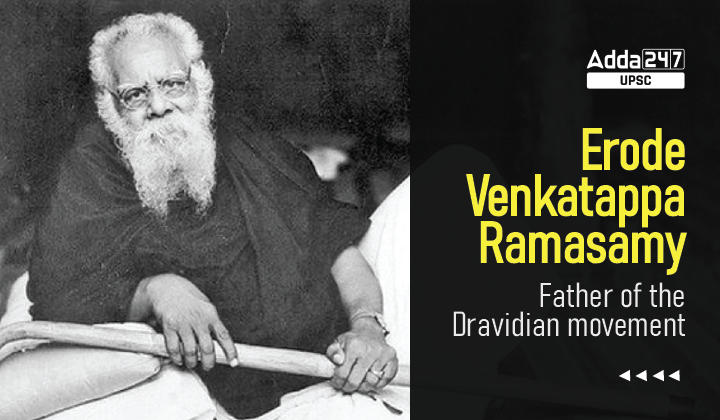Table of Contents
Erode Venkatappa Ramasamy: Father of the Dravidian movement- Relevance for UPSC Exam
General Studies I- Modern Indian History.
Context
- We celebrate Periyar E.V. Ramasamy’s birth anniversary (September 17) as Social Justice Day.
Who is Periyar?
- Erode Venkatappa Ramasamy, revered as Periyar or Thanthai Periyar, was an Indian social activist and politician who started the Self-Respect Movement and Dravidar Kazhagam.
- He is known as the ‘Father of the Dravidian movement’.
- He rebelled against Brahminical dominance and gender and caste inequality in Tamil Nadu.
Self-respect movement
- The self-respect movement was founded by V.Ramaswamy Naicker, commonly known as Periyar.
- It was a dynamic social movement aimed at destroying the contemporary Hindu social order in its totality and creating a new, rational society without caste, religion and God.
Periyar: The Vaikom Hero
- V. Ramasamy Periyar led the famous Vaikom Satyagraha in 1924, where the people of down trodden community were prohibited to enter into the temple.
- Finally, the Travancore government relaxed such segregation and allowed the people to enter into the temple.
- Periyar was given the title of ‘Vaikom Hero’.
- The Satyagraha began with the active support of the Kerala Pradesh Congress Committee.
- Within a week all its leaders were behind bars. George Joseph sought directions from Gandhi and C. Rajagopalachari. He also wrote to Periyar pleading with him to lead the satyagraha.
- Periyar was in the midst of political work as he was then the president of the Tamil Nadu Congress Committee, Periyar handed over temporary charge to Rajaji before reaching Vaikom in 1924.
- From that date to the day of the victory celebrations in 1925, he was in the struggle giving it leadership at a critical juncture.
Periyar’s role
- Periyar presided over the satyagraha in the face of violence and indignity inflicted by the orthodox and the repression of the police.
- To mobilise support, he visited villages in and around Vaikom and delivered public speeches in several towns.
- When the Kerala leaders asked for Gandhi’s permission to make the satyagraha an all-India affair, Gandhi refused saying that volunteers from Tamil Nadu would keep it alive.
- The British Resident said in his report to the government of Madras: “In fact, the movement would have collapsed long ago but for the support it has received from outside Travancore…”
- Historian T.K. Ravindran observes that Periyar’s arrival gave “a new life to the movement”.
His Vision for the future
- When he presented his thoughts, there was nuance, honesty, and an explicitness, which prompted even people practising different faiths to discuss and debate his ideas on rationality and religion.
- Periyar himself said, “Everyone has the right to refute any opinion. But no one has the right to prevent its expression.”
- Periyar is often referred to as an iconoclast, for the rebellious nature of his ideas and the vigour with which he acted.
- His vision for the future was a part of all his actions and did not merely aim at the eradication of social evils; he also wanted to put an end to activities that do not collectively raise standards of society.
Foundation of rationalism
- Periyar’s vision was about inclusive growth and freedom of individuals. He was an important ideologue of his day because of the clarity in his political stand. More importantly, he understood the evolution of political thought and was able to glide through time with this.
- He said, “Wisdom lies in thinking. The spearhead of thinking is rationalism.” Periyar was way ahead of his time. He further said “Whomsoever I love and hate, my principle is the same. That is, the educated, the rich and the administrators should not suck the blood of the poor.”
- There have been several social reformers in Tamil Nadu who shared their revolutionary thoughts with the people in the past century. In that spectrum, Periyar occupies a unique place because he made interactions of multiple worlds possible.
Periyar said, “Any opposition not based on rationalism or science or experience, will one day or other, reveal the fraud, selfishness, lies, and conspiracies.”
Conclusion
- His works against the Brahminical dominance, oppression of women in Tamil Nadu, caste prevalence is exemplary.
- Periyar promoted the principles of rationalism, self-respect, women’s rights and eradication of caste.
- He opposed the exploitation and marginalization of the people of South India and the imposition of what he considered Indo-Aryan India.




 TSPSC Group 1 Question Paper 2024, Downl...
TSPSC Group 1 Question Paper 2024, Downl...
 TSPSC Group 1 Answer key 2024 Out, Downl...
TSPSC Group 1 Answer key 2024 Out, Downl...
 UPSC Prelims 2024 Question Paper, Downlo...
UPSC Prelims 2024 Question Paper, Downlo...




